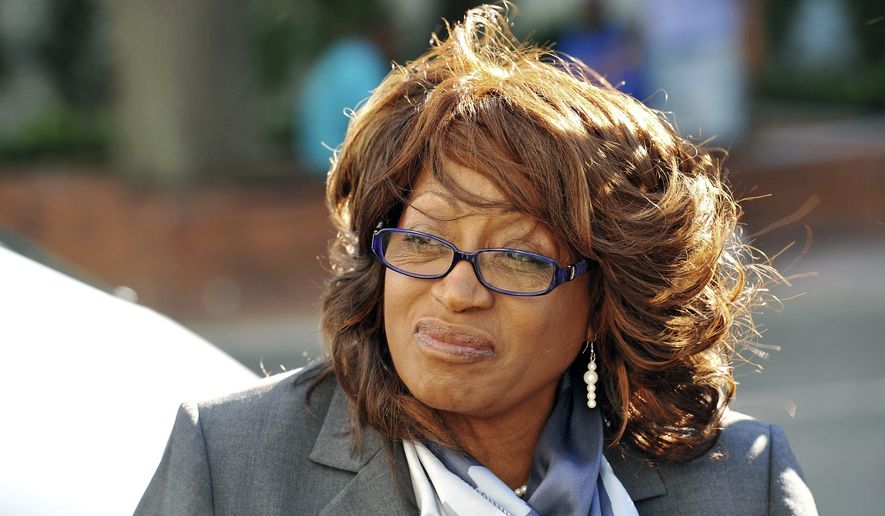A federal circuit court reversed a judge’s decision to dismiss a juror who sought divine guidance from the Holy Spirit during deliberations and told fellow jurors he was told by the higher power that the defendant was innocent.
The 7-4 ruling from the full 11th U.S. Circuit Court of Appeals allows for a new trial for the defendant, former Rep. Corrine Brown, a Florida Democrat who was convicted and served prison time for a conspiracy and fraud scheme involving a bogus scholarship charity.
A majority of the judges on the court reasoned the juror, identified only as Juror No. 13 in court papers, was able to deliberate based on the evidence and the law despite his comments to fellow jurors about seeking religious guidance.
“Jurors may pray for and believe they have received divine guidance as they determine another person’s innocence or guilt, a profound civic duty but a daunting task to say the least,” wrote Judge William Pryor Jr., a Bush appointee.
He cited a prior case that recognizes prayer is “a part of the personal decision-making process of many people, a process that is employed when serving on a jury.”
Judge Pryor, writing the opinion for the court, said the lower court judge “was wrong to conclude that Juror No. 13’s statements that he received guidance in response to prayers were categorically ‘a bridge too far.’”
Richard Garnett, a law professor at the University of Notre Dame, said courts should be reluctant to remove a deliberating juror.
“Regular people talk in a wide variety of ways about their thought processes. It would be strange to remove one juror who used the language of religious inspiration while protecting another who spoke in terms of ‘gut,’ ‘intuition,’ or ‘conscience,’” Mr. Garnett said.
The issue arose in the Brown trial when a fellow juror, identified as Juror No. 8, alerted the district court judge that Juror No. 13 made references to “higher beings” during deliberations.
“I’m a little concerned about a statement made by Juror #13 when we began deliberation. He said ‘A Higher Being told me Corrine Brown was Not Guilty on all charges.’ He later went on to say he ‘trusted the Holy Ghost,’” Juror No. 8 wrote to the judge.
The judge then probed Juror No. 13 about his comments.
Juror No. 13 admitted to telling jurors that a higher power was guiding his thinking but said he was able to follow the evidence and the law as instructed by the court.
“I’ve been following and listening to what has been presented and making a determination from that, as to what I think and believe,” he told the court.
Nevertheless, the judge dismissed the juror and appointed an alternate to serve in his seat. The jury then returned a verdict finding Brown guilty of 18 counts and not guilty on four other charges.
The circuit court‘s decision gives Brown the right to a new trial. She had argued on appeal that the dismissal of Juror No. 13 violated her constitutional rights to a fair trial.
In 2016, Brown and her chief of staff were indicted on charges related to the non-profit One Door for Education charity. The charges included conspiracy to commit mail and wire fraud, defraud the Internal Revenue Service and stealing government property.
She was convicted the next year and served about two years in prison before she was released on house arrest due to COVID-19 concerns and while her appeal was pending.
A new trial date has not yet been set, according to her lawyers.
The Justice Department declined to comment on the case or whether it will appeal the court‘s decision.
In a dissent, Judge Charles Wilson, a Clinton appointee, said the district court judge was able to probe Juror No. 13 and “observe the juror’s tone.”
“Because the district court was ‘uniquely situated’ to make this determination, I would not supplant its judgment with my own,” Judge Wilson wrote.
Lea Patterson, a lawyer for First Liberty which helped represent the defendant, said the ruling underscores the importance that our nation places on religious liberty.
“The reason why juries represent a cross-section of communities is to ensure we get the most accurate juries we can and disqualifying eligible people because they seek divine guidance undermines that right of a defendant to a fair trial,” she said.
Douglas Laycock, a law professor at the University of Virginia, said he doubts the ruling will have a big impact on other cases because it’s an issue that comes up so rarely.
“The privacy of the jury room is sacrosanct; we don’t ask jurors how they reach a decision,” he said.
• Alex Swoyer can be reached at aswoyer@washingtontimes.com.




Please read our comment policy before commenting.